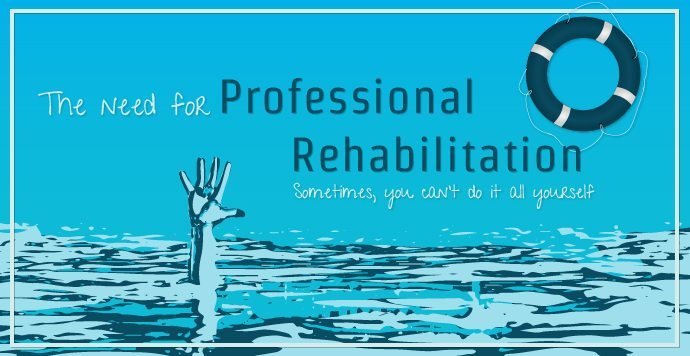The Need For Professional Rehabilitation

I had been to treatment for alcohol and drug addiction twice before I got sober the third—and hopefully final—time.
However, even before I went to the professionals, I tried to get sober on my own.
It didn’t work.
My first experience with liquor wasn’t to simply imbibe a little drink here or there—I wanted to hit it, and hit it hard. I wanted to know what it felt like to get drunk. I was about sixteen years old when I first drank.
My mother kept a stash of hard liquor in a cabinet above the refrigerator. One evening on a weekend, I waited for my parents to go to bed. With every muscle tense from my attempt to go into full-blown sneak-mode, I gently lifted the chair I needed to step up to the cabinet. Like an elementary kid carefully inserting a knife into a wrapped Christmas present to see inside, I opened my mother’s liquor cabinet door.
My parents weren’t big drinkers. They put aside an array of various liquors in that cabinet for parties. Guests could have something nice to drink. As for me, that first time, I was a kid in a candy store.
I didn’t know what to take, so I opted for brandy, since my mother drank that occasionally before she went to bed.
Glug, glug, glug. I poured the liquor in the glass and made a silent statement to myself: Bottoms up, Dan.
You can figure out what happened after. It wasn’t fun. Well, some of it was.
Back then, I ignored the bad effects and looked to the good: I was more confident, relaxed, and the aching lack of self-confidence eating at me disappeared. The initial experiment turned into a habit. And the habit turned into dependence.
Fast forward from age sixteen to age thirty-one: my friends and family had begun to notice that my drinking wasn’t normal. Added to the fact that drinking was wreaking havoc on my body, I wanted a way to drink more normally, or at least to cut down so my wife and my family would lay off hassling me about my use.
First, I tried to do it myself. I made promises and set limits. These I broke easily, because I didn’t know that I was an alcoholic and that all alcoholics cannot simply set limits.
After that, because the alcohol began ripping into my guts (I was diagnosed with acute pancreatitis), I wanted to stop. I started to go to AA meetings. I have to be honest and say that much of the reason why Twelve Step recovery didn’t work for me back then was because my heart really wasn’t in it. I didn’t “work The Steps” or subscribe to the program. I just went to meetings. And rarely, at that.
I needed more help. I needed professional help.
Today, recalling those years before I got sober, I’m aware that alcohol affected my brain and my body differently than what other, more normal drinkers experience. However, today I’ve been to treatment. Today I’m educated on what alcohol can do to a person’s mind and body. More importantly, I have the tools to stay sober.
Beyond trying to fly solo, I did try treatment, but I couldn’t find a good fit. One of the benefits we have in the United States, is that there are many options for those trying to find sobriety. Relapse is common, and professionals know this. That doesn’t mean that professional treatment doesn’t work. In fact, I learned a bit from each of the places I went to, and today I have incorporated those pieces into the larger puzzle. I see the big picture.
I finally was defeated in my attempt to keep drinking and drugging as a little secret side-hobby by two arrests—one a DUI and the other a felony count of trespassing. Ultimately it was required that I get professional help or face the consequences.
Here’s what I found about professional treatment that differs from trying to get sober on your own:
It’s Not As Bad As You Think It’s Going To Be
When my brother drove me to rehab, I thought that it was one of the worst things that could happen to me. It felt like an embarrassing loss and that I was the loser.
It’s true. My life was a mess. However, going into treatment was the first good choice I had made. The doctors and nurses gave me medication for withdrawal. Soon after, I was with others who had experienced the same feeling of defeat in their lives.
After hearing others’ stories of drug and alcohol abuse, I knew I wasn’t alone. We cried together. We laughed together. We were stuck there, so we had to learn how to live with each other, albeit for a short time.
It may seem strange, but looking back on that time, it brings a smile to my face. I remember all the good that came out of it, and the lifelong relationships I developed.
Medical Science Really Does Matter
I attend a Twelve Step group today. It’s part of my weekly routine. The professionals helped me develop this healthy habit while I was there.
However, Twelve Step groups do not keep up with the medical advances that have been made since those groups were first organized.
It’s clear that addiction is a condition affecting both the human brain and body. In many ways, addiction is similar to mental illness with one important difference—it requires the addition of a chemical to mix. Addiction is an induced mental illness. The DSM V labels addiction as a substance use disorder for a reason. Treatment for addiction requires an understanding of how the chemicals affect a person, and how best to treat it with the most modern medical science.
Treatment centers have professionals who not only have the training to deal with addiction from a medical standpoint, but these professionals also have the education and the experience to best know how to do it.
It’s Only For A Short Time
When I was in treatment, the hours seemed to drag on forever. I understand now that alcohol and drugs had a detrimental effect to my perception of simply being there.
As much as we look at an entire month as an unendurable length of time, it’s really not. Adding outpatient treatment to the mix, a person doesn’t even need to remove him- or herself from the demands of life completely. Treatment centers offer options for a reason. However, most will recommend whatever level of care that a patient requires. In my case, I’m glad I went away for inpatient treatment.
After the time is completed, most people chuckle at the thought that one whole month looked like a huge sacrifice in the first place. The time I spent proved to be invaluable.
With as many options people have today, the choice is clear: professional treatment is the way to go. The cost that you might have to spend might look formidable for many, but ask yourself this: say you were recently diagnosed with cancer—wouldn’t you do anything and everything possible to get better?
Make no mistake, addiction kills. Millions worldwide fall victim to its deadly grip. I’m thankful that I got the professional help I needed when I did.
Daniel D. Maurer is a freelance writer openly living in long-term recovery. He is the author of Sobriety: A Graphic Novel, a Hazelden Publishing youth and young adult resource. He lives with his family in Saint Paul, Minnesota.



 Resources about addiction and recovery
Resources about addiction and recovery
